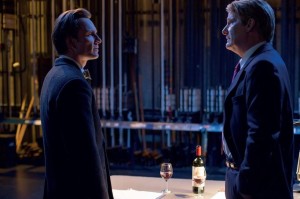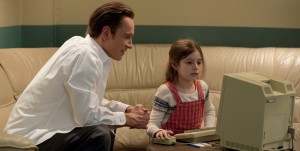Chronicling a life that ranks with Einstein’s in terms of societal and scientific accomplishments for a biopic is one of the more challenging endeavors a director and screenwriter can undertake. Lucky for Steve Jobs and those who want to get inside the head of the man who changed the world, we’ve got writer Aaron Sorkin and director Danny Boyle.
Steve Jobs tells the tech icon’s story in three parts, much like a three-act play. And like Sorkin did with his A Few Good Men Broadway production, he has a mastery of the stage that translates impeccably to the screen in the hands of the right helmer. After stunning work on Slumdog Millionaire and 127 Hours, clearly Boyle was up for the task. The two combine to give us a look at three product launches by Jobs and take us deep inside how they went down as a plot device of showcasing the man behind the technology. The picture that is painted is one of a man who is exceedingly human, faulted, brilliant and at times as calculating and cunning a some of history’s most notorious people.
The biopic is a sometimes thankless endeavor for a filmmaking team. Get it wrong and that person’s extraordinary story gets buried with the failure of the film. Oftentimes the Achilles heel of the biopic is they try to capture a legendary life in two hours, which is as close to impossible as one can get. What Sorkin and Boyle do with Steve Jobs is simply show us three of the visionary’s most titanic product launches and within the framework of that 20-year period, the audiences gets a keen picture as to who Jobs was as a man, as a father, as a tech titan and as a cultural icon.
The three product launches are the Macintosh in 1984, the Jobs goes at it solo NEXT product launch of 1988 and then the iMac launching that would bring the Apple founder triumphantly back to the company he co-founded and firmly into the lexicon of modern cultural marvel.
What else is so fascinating about Steve Jobs is that Sorkin has told a far-reaching tale of the man’s life through a format that could also work for the theatrical stage. It has a Shakespearean feel to it and like many of the Bard’s heroes who have tragic flaws, Jobs is no different. In this swath of time, it comes in the form of two fronts – a daughter who he swears is not his, although he financially acts like she is, and his battle with company co-founder Steve Wozniak (an impeccably cast Seth Rogen) over publically acknowledging the Mac II development team that made Apple a fortune 500 company, but whose successful days are firmly in the past.
Then, there is his relationship with his longtime marketing maven, Joanna Hoffman (Kate Winslet). She is there through all three launches and truly serves as his conscience on dozens of issues, and is almost a Jiminy Cricket to his Pinocchio. She is like the blood relative that he never had, as is pointed out many times in Boyle’s film that Jobs was adopted. Speaking of that, Jeff Daniels nails his role as Apple CEO John Sculley, a person who clearly was a paternal influence on Jobs and like his real father, winds up betraying him in the well documented split that sent Jobs away from his beloved company.
Boyle is the key to the entire film working as magically as it does. Sorkin can paint a perfect picture, but it takes a true filmmaker to bring it to life in living color. His choices as a filmmaker are brilliant. The first act, with the Macintosh launch, is shot in a grainy film format that makes it feel like you are watching old movies. By the time we get to the iMac launch, the film tone is crisp, like digital cinema — that gives us the feel that this is a modern moment. The helmer also gets the most from his performers, most triumphantly Fassbender.
Fassbender is a revelation. He is a stunning presence the moment he appears on screen. He is custom built to deliver the Sorkin rapid fire dialogue and he is also key to Sorkin’s words working, as the screenwriter needs someone who can make his words come to life and be believable that someone, anyone, can sound that smart! Fassbender does it and if he doesn’t win an Oscar for this role, frankly, we would be shocked. It is that much of a cinematic explosion of thespian triumph.
Grade: A+




